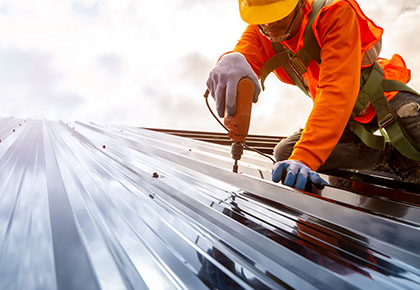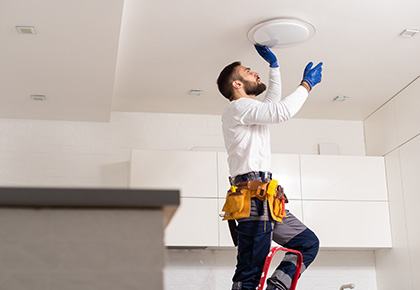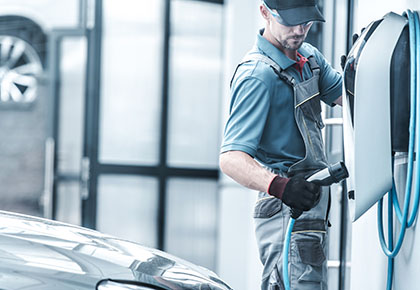Narrow Results
-
Fall tips for homeowners: Your comprehensive checklist
Whether your HOA is self-managed or professionally managed, getting started on your fall and winter prep will help keep your operations running smoothly as the seasons and temperatures change – and that will keep your residents happy as well. -

Capital improvements vs repairs and maintenance: What’s the difference?
Maintaining your buildings’ assets is not a one-size-fits-all proposition. The common areas require a broad range of routine maintenance and repairs to keep them looking good and operating smoothly. -
Three things to know about community maintenance
Whether your community is self-managed or professionally managed, maintenance is a big part of the day-to-day responsibilities. It’s a responsibility that can quickly become overwhelming, especially when you walk in on a Monday morning to a list of what went wrong over the weekend. -
Tips for community waste management in your association
With a growing focus on proper environmental stewardship, many associations are working toward implementing green initiatives. But getting there can be daunting. With so many programs and opportunities available for all of us to reduce, re-use and recycle, it’s hard to know where to begin. -
How to handle mold in your association
No one wants to find mold in their home or any association building. Unfortunately, mold is ubiquitous – it’s in the air and in the water, and when given the chance, it spreads like crazy. Learn steps to prevent mold or to have it assessed and properly treated, preserving your buildings and the health of your residents. -
9 tips about board of directors conflicts of interest
It’s a term that gets tossed around quite a lot. But “conflict of interest” is a real and genuine threat to your association and its proper stewardship. Understanding what the term means – as well as how to recognize and avoid conflicts of interest– can go a long way toward ensuring the strength and stability of your community and eliminating many concerns. -
FirstService Residential Executive Discusses Offbeat Second Home Investment Locations and Trends
While exclusive communities like the Hamptons or Malibu will always be attractive locations for affluent vacation home buyers, several new trends are emerging in the growing second home market. -
Pros and Cons of Do It Yourself Repairs and Maintenance
FirstService Residential's Bill Worrall discusses the hidden costs of DIY maintenance and repairs and provides great insight into how boards can determine what can be done in house and what should be subbed out to appropriate contractors. -
Put an Energy Saving Program Together for a Multifamily Property
Many HOAs and community associations would like to save energy and energy spending, but they think that putting an energy management plan into place for their multifamily property is difficult to accomplish. FS Energy's Chris Normandeau explains some basic, easy-to-do steps that can make a real impact on an association's energy usage and budget. -
Hiring a reserve study company: Five things to know
In our guide to capital improvements , reserve studies and their relationship to capital improvements and preventive maintenance were discussed at length. -
Seven tips to finding a reserve study company
Your reserve fund is what helps your association anticipate its future– and budget for it, too. This fund gives you the power to maintain the quality of your community by allowing for projects that are both necessary and expensive (like a future roofing or paving project, for instance). -
Fighting mold in your condo or HOA: A step-by-step guide
It’s the scourge of households everywhere: the unsightly, unsanitary, unbecoming sight of mold. But waging war on mold means more than launching a full-scale assault when you see it (though that can be part of the battle plan). Instead, consider a comprehensive strategy – here are some tips to help you get started and steer clear of mold. -

5 energy conservation strategies for community associations
In this article, we delve into the significance of energy conservation within community associations, exploring its benefits and strategies for effective implementation. -
Energy efficiency tips for winter
So what can condo boards or community associations do to mitigate or even reduce costs this winter? Let’s start with what you can do in the summer and fall, before winter actually begins. This includes cleaning, tuning and performing any necessary repairs to heating systems, furnaces and boilers to make sure they won’t be working longer, harder or less efficiently than they should. Other pre-winter tasks include cleaning gutters to remove leaves and debris to ensure water can flow freely. Otherwise, water can become trapped and freeze, which can not only damage your property’s gutters, but also cause ice dams and possible roof leaks. -

What to know about condo EV charging
If your high-rise condo is ready to start looking into electric vehicle charging stations, these steps can provide a holistic overview of the process and what you can expect. -
What is a fire hydrant? What to know about community fire hydrants
Aside from knowing to not park next to one, how deep is your knowledge of fire hydrants? Unless you’re a firefighter, it’s probably not that extensive. This may not be a problem... until the unthinkable happens and you need to be confident that your fire hydrants are in good working order. But like any equipment in your community, fire hydrants need to be maintained. -

Can HOA fees increase? The benefits of raising HOA dues
What exactly are HOA dues, and can an HOA raise dues without notice? In this article, we’ll explain what HOA dues are, HOA fee increase limits, and five benefits of small, regular increases. -
Surprising ways to stretch your HOA's dollars
If you’re on the board of a condo, co-op, high-rise or HOA, you know that managing your community’s budget is a major priority. You’ve likely explored many ways to save money and get the best deals, while still maintaining a high level of service. -
Three residential drainage problems and their solutions
Unless you live in an area where it hardly ever rains (in which case you have a whole other set of problems), drainage will be an issue in your community. Proper drainage is, of course, the answer, but getting there means you have to meet stringent requirements throughout different areas of your community. -
Tips for an eco-friendly building: Sustainable high-rise living
Many multifamily properties and high-rises want to implement “green” living practices and create eco-friendly communities, but not everyone knows where nor how to get started. Here are some effective and easy tips to help you be proactive and successful in achieving your sustainability goals. Read on for a list of programs and services that can be put in place in your community at little to no cost. -
Mortgage loan tips: Preparing and applying for a mortgage
We’ve got the scoop on how to get a mortgage loan, so read on for our top six tips to increase your chances. -
How to winterize a home in your HOA community
It’s that time of year again – there’s a noticeable nip in the air, trees are losing their leaves and stores are starting to display their holiday swag. That can only mean one thing – winter is right around the corner. If your HOA is located in an area affected by wintry weather, we probably don’t need to remind you about last year’s Arctic-level freeze. Some of the coldest-ever temperatures were recorded in many parts of the country – and if you heed the predictions in the Old Farmer’s Almanac , you know that this year promises to be even more frigid. Is your community prepared to handle the upcoming chill? Here are some tips to help your homeowners association winterize your community, no matter what surprises the season may bring. -
How to start a recycling program in your community
Is your homeowners association considering starting a recycling program for your community? If so, bravo! Take a look at some of the benefits: conserving energy, saving water, preserving resources, reducing air pollution and saving landfill space. And did you know that in addition to helping the environment, recycling can also provide economic benefits as well? To get you started, here are some tips and considerations to help your association plan and implement a successful recycling program for your community. -

Empowering Communities: Maximizing efficiency through energy audits
Energy audits serve as a critical tool for identifying inefficiencies, pinpointing areas of improvement, and ultimately fostering a more sustainable environment within community associations.